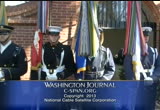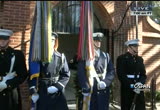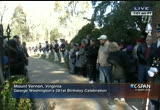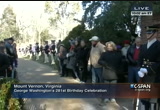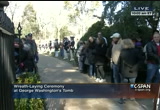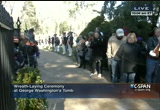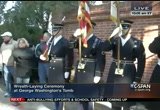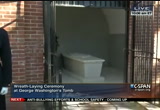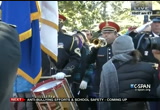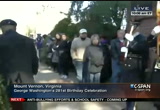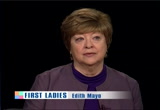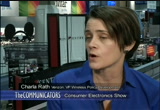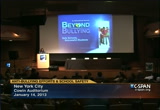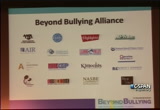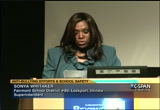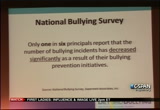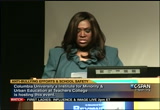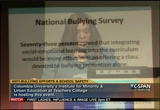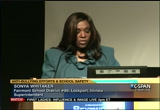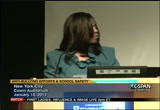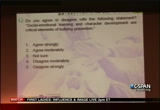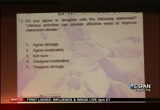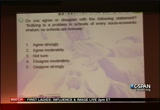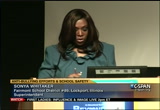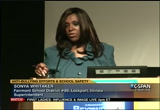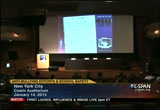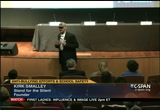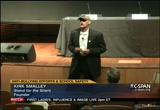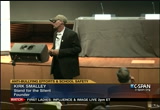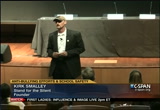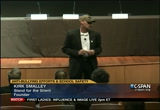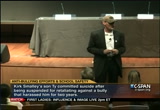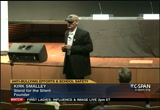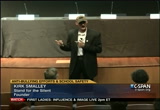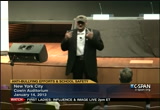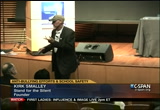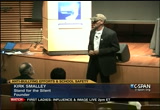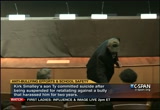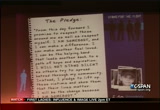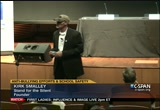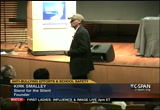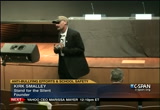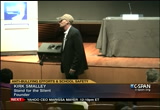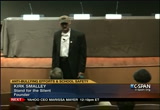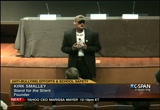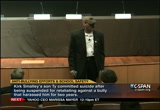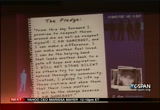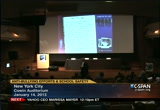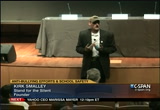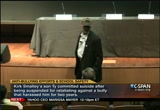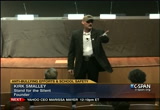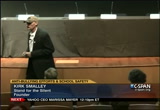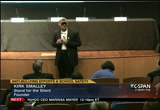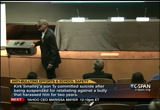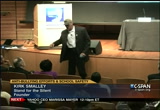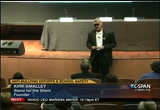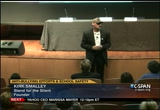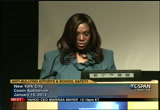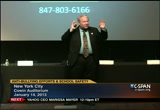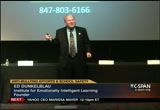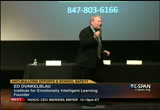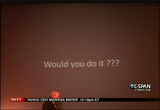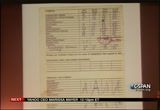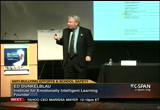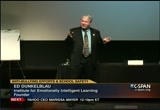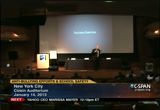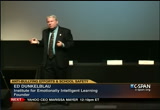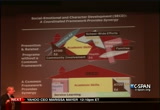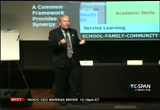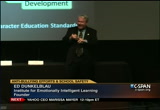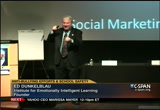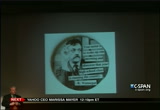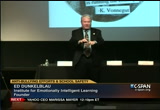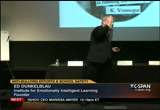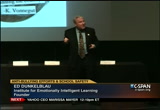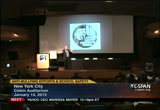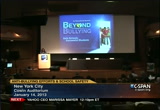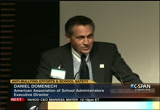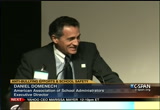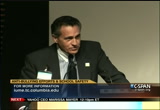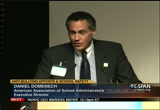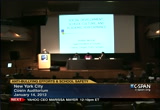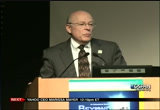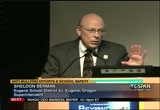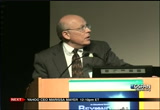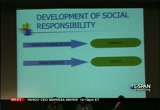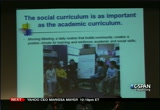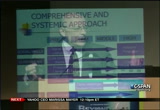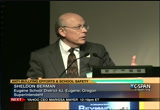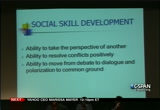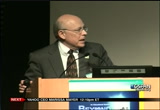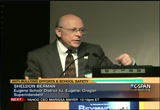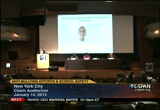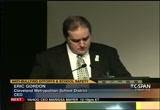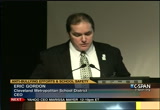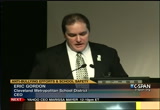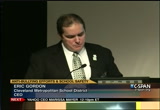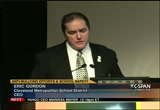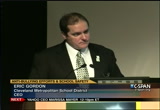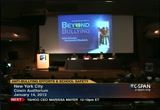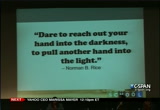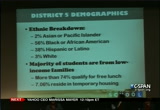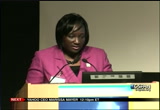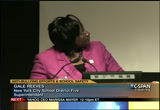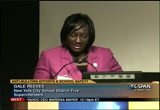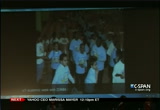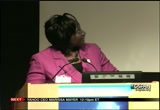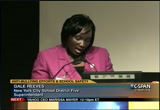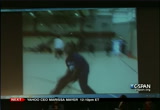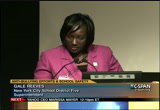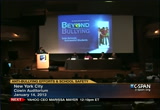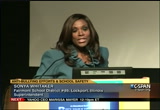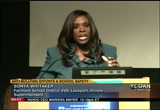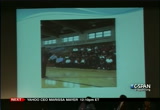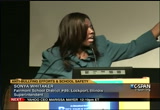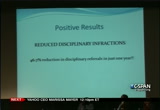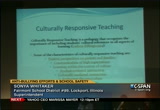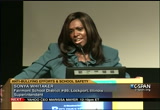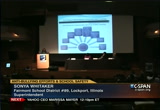tv Politics Public Policy Today CSPAN February 18, 2013 10:00am-12:00pm EST
10:00 am
10:01 am
>> some of the people lined up here at mount vernon. this president's day, we are at the home of george washington, where they are celebrating washington's 281st birthday. his personal copy of the constitution is here with his hand written notes. this will be the last day it is on display at mount vernon and -- at mount vernon.
10:08 am
10:09 am
other reactors who are pre -- who are recreating the era of george washington, and another riesling ceremony this afternoon. c-span is going to be visiting several significant locations on this president's day. in the meantime we are going to bring you a summit on bullying from the columbia university's institute for urban locate -- urban education. later, a look at mental health and addiction. >> i think the women themselves, in many cases, were interested in politics, but had no vehicle to express that in their lives so they were attracted to men who were going to become politically active or who were already politically active. >> each of them i find intriguing precisely because they are so obscure historical
10:10 am
a. i think half of these women would be totally unrecognizable to note -- unrecognizable to most men and women on the street. >> from the historic decatur cast in washington d.c., exploring the lives of women who served as first lady. in a first of its kind project for television, season one begins tonight at 9:00 eastern and pacific. watch the program earlier in the day live at 2:00 p.m. eastern on c-span. >> what worries me is that i do not want to be sitting in the same place i was a couple of years ago going to the government and saying we need -- i would like to see a process of
10:11 am
sector management that was much more market-driven. incentive options will continue to work. the secondary market works in a little bit of a smoother way than it does now. >> you look at the growth rate in patent usage -- in data usage, we are seeing 50% rate on an annual basis. there is no slowing down. there is this insatiable hunger for more capacity, faster speed -- cable has a long feature of being able to speed up. withre from this year's the future of cable, spectrum use, and more tonight on "the communicator's." next, a look at bullying.
10:12 am
the summit focused on a holistic approach to address bullying, including social and emotional learning and character building. they talked about the successes in their own school district and how teaching tolerance and passion is effective in reducing bullying. this is about two hours. >> good morning. thank you so much for being here. it is indeed a pleasure and an honor to stand before you today. i would like to introduce
10:13 am
myself. i am dr. sonya whitaker. i am very happy to serve as your moderator for today. welcome, we are so thrilled you are here today. on behalf of the summit hosts and the institute for urban and minority education here, i would like to thank you for participating in today's event where we will address the critical issue of how to stop bullying in our schools. i would also like to take a brief moment to recognize the members of the beyond bully alliance, the coalition of resources for character development and emotional learning.
10:14 am
every single day, future educators what the hall of this building and sit in this very room as they prepare to teach and remove -- for their future students. college, one of the four most graduate schools for education has been chosen as the venue for today's very important event. it has been done so to reserve -- to serve as a reminder of the commitment to our students of the social character development skills and save positive learning environment that fosters their success. each of us is here today because we are seeking answers. answers about how to address one of the largest impediment to achieving this goal. bullying.
10:15 am
i would like to present you just a few steps, if that is okay. nearly half of middle school principals who participated in a national bullying survey indicated that this issue ranked as one of the top five challenges in their school. we are indeed making progress into dispelling the myth that bullying is merely a rite of passage. currently, 49 states have implemented anti-bullying politics. according to the national bullying survey, only one in six principals report that the number of bullying incidents has decreased significantly as a result of their bullying initiatives. despite our best efforts bullying continues to plague our students and we can have it in our schools. as educators and participants in
10:16 am
today's summit, we are well aware that providing the skills and tools that promote safety and well-being among our students is no less important than preparing them for a great academic achievement. [applause] to invoke lasting change in our schools and the lives of our students we must once again -- we must address the topic of bullying from the pro-active perspective as opposed to be reactive. we must teach our students from an early age what it means to be empathetic, culturally sensitive, and supportive of their peers. we must teach them how to recognize and unmanaged -- and manage their e motions.
10:17 am
when the social character development skills are incorporated into the curriculum, the benefits transcend beyond bullying prevention and even beyond the classroom. these skills positively impact personal lives and social relationships. it helps them build strong characters that will help them develop into amazing citizens. the question still remains. how do we ensure that every student is equipped with these social essentials skills. did you know that 73% of principals who participated in the national bullying survey agreed that integrating such methods into the academic curriculum would be more effective than offering a class devoted to bullying prevention alone?
10:18 am
this brings us to the purpose of the beyond bullying summit. today, you have the opportunity to learn about the research behind social and emotional learning and how to effectively integrate it into the curriculum. and you will walk away with a better understanding of how we can prevent bleeding for both schools safety and hire a student achievement. -- and higher student achievement. we like to hear your thoughts. our goal is to hear from you, the participants, about your thoughts related to its anti- bleeding initiatives, social- emotional learning, and character development. the response to these questions in addition to those from the follow-up survey will be administered this afternoon. so please expect that you will be in the process of participating.
10:19 am
the purpose of this survey will be for us to engage and understand the current issues and the research that will be in today's summit. at this time i would like to ask that you respond to the moment -- respond to the package that has been given to you -- remove this in the packet. you simply need to push the number corresponding to the answer to the question. the first question is, "is bullying more of a problem than it was 10 years ago or less of a problem? or would you say it is about the same?" please submit your responses.
10:20 am
"do you agree or disagree with the following statement -- schools that reduce the incidence of bullying are likely to see an increase in academic performance -- including a rise in standard test scores?" "do you agree with the following statement -- social-emotional learning and character development are critical elements of bullying prevention."
10:21 am
"de you agree or disagree with the following statement -- social-emotional learning has a positive impact on students' personal and social relationships." do you agree or disagree with the following statement? "leprosy activity can provide effective ways to improve classroom climates." -- "literacy activities can provide effective ways to improve classroom climates."
10:22 am
do you agree or disagree with the following statement? "the demands imposed by state and national standards, such as the common core state standards, the teachers with two little time to address bullying effectively." do you agree or disagree with the following statement? "bullying is a problem in school of every social economic stratum, no schools are immune."
10:23 am
in schools today, which would be a more effective way of addressing bullying? thank you very much. just before i introduce our keynote speaker, i would like to discuss a very few season items with you. in the packets you have received there is a couple of things that you will find located in them. number one, you will find this clicker. you are also going to see a copy of the schedule.
10:24 am
the index cards that are located in your packets, you are going to want to pull those out sooner rather than later so you can immediately write down questions that will then be used for our question and answer part of the program today. you are going to find and a valuation form, as well as a suicide prevention resource sheet. you will find the summit participation certificate will be issued to all of you that participated, as well as a handout on the last session. for the sake of my introduction, each presenter will be brief. i highly encourage you to refer to the biographies of those speakers that have prepared -- of those speakers that have been prepared for you today. before you leave the summit, it is important to leave the clickers in the red boxes outside the exit. we ask that you please silence your cell phones.
10:25 am
two final reminders. food and beverages are not permitted. we've it also like to remind you that today's event is indeed being videotaped. with that being said, i would like to introduce our keynote speaker. as an anti bullying advocate and tyrant who has experienced the consequences of bullying presentationirk's reiterate our purpose today, which is to move beyond of bullying and foster school safety and student success. please join me in welcoming kirk. [applause] >> hello guys. my name is kirk.
10:26 am
more importantly, i am here today to talk to you guys not as an educator. i am not any kind of a teacher. what i'm here to do is tell you what happened to our son, and i am hopeful by doing that you can make sure it never happens again to another kid or another family. i am going to warn you about something -- i am not a public speaker. what i am is a construction worker. what i'm going to tell you we feel really strong about. we have a group of kids called "stand for the silent."
10:27 am
this is the american sign language symbol which means "i love you." it means i got your back. if you could throw one of these at me when i'm having a hard time i will try to get through it. i hope you could learn a little something from me today. i am hoping i could learn something from you. that you can teach me that there are people in this world besides me and a group of kids that actually care about the efforts. 988 days ago i left for work at four o'clock 30 in the morning. -- at 4:30 in the morning. my wife and kids left a couple
10:28 am
hours later. laura worked at the school my son went to. she actually took that job so she could be near him. so she could be off work the same day he was out of class. they were best friends. they were together 24 hours a day, seven days a week. on that particular day, tyler was sitting in the gym with his best friend, they were waiting for class to start. these kids that were picking on him for two years started picking on him again. i guess he finally had enough. he retaliated. do you know what happens when you retaliate?
10:29 am
the second guy always gets caught. the public gets to plan his move. he waits until nobody is looking and he knows what ever it is he is going to do. the victim just reacts. they see the second guy take a swing every time. that is what happened to ty. he retaliated, he got caught. he was suspended for three days. they called his mama. she went and picked him up and took him home. they were shorthanded that day at work and laura had to go back. she told ty to do his homework,
10:30 am
10:31 am
10:32 am
he shot himself. i ask her, "who?" she said, "ty." since that day, laura and i, we have talked to families all over this world with kids who had done that same thing. i personally know of over 800 children who have taken their lives because of being bullying. we have met two hundred 50 of those families in person. that is 800 babies lost. 800 families ruined. january 21, 2010, a young man
10:33 am
named montana, he was nine-years old, he lived in a place called the colony down in texas. montana retaliated against a bully that was picking on him all year long. the second guy always gets caught, too, huh? he was sitting in the office waiting on his mother to come in and pick them up and taken home. he asked if he could go to the bathroom. they let him go to the nurses bathroom, the only one in school that had a lock on the door. nine-year old montana took off his own belt and hung himself in the nurses' bathroom.
10:34 am
we had a meeting out of our house a while back. we invited literally everybody that we could think of to come out and help make sure this could never happen again to another family. 30 people showed up, there was this young mother from oklahoma. she was telling me about her six-year old daughter who was being picked on by a little boy. this little five-year old boy told this six-year old girl, with one week of school left, i am going to bring a gun to school on the last day of school and i am going to kill you. the next morning, she woke up and she was crying. she told her mom. "mama, i don't want to go to
10:35 am
school today." her mom asked if she was sick. "no, mama. i'm not sick." her mom said, "you really need to go." next morning she woke up and she was crying again. she told her mom, "mama, please." don't make me go to school today." her mom said, "baby, it's almost over." she just ahd a couple more days. three days left in school. that morning gina wasn't crying any more.
10:36 am
she looked at her mom and said, "i'm not going to school today." "i will just kill myself, instead." she was 6-years old. her mom was caught totally off guard. the woman didn't have a clue what to say. she said, "gina, baby, why would you say that? how would you even do that? " gina looked at her mom and said, "i know exactly how i will do that. i will get daddy's hunting rifle down.
10:37 am
10:38 am
matt has this little habit. he likes to call people nicknames. he thinks they are funny, he thinks they are real cute. his nickname for me was always, "worthless. ' he didn't really think i was worthless, it was something he just said. he would call me and say, "hey worthless, what are you doing?" one day, not very long ago, i was feeling pretty worthless. mack called. -- matt called. he learned that day but one word could do to somebody if it
10:39 am
catches them at the wrong time. i know we are not perfect. we are not even asking you to try to be. we are all going to make mistakes. what we ask is that when we do that we have to learn that we can go back and we can apologize. believe me, it can make a lifetime's worth of difference to somebody. the day after my boy killed himself they were telling jokes about it at his school. got the livingnd daylights pounded out of him.
10:40 am
he heard those jokes and went up trying to defend my boy. my boy's mama heard those jokes. i heard them. how funny you guys figure that one was? i realize it takes a lot of courage just to be the one that can stand up and say that is not right. how would you like it happened to your friend? your little brother? maybe your son?
10:41 am
it is a whole lot easier to laugh with everybody else, isn't it? more than reading, writing, and arithmetic, i think it is time we all learn respect for others, tolerance for differences, how to be the difference in somebody else's life. you guys out there in the trenches, you have to be the one. you have to be the person who can go up to that kid. everyone of us know who we are talking about. you can see that kid in your own head right now. he doesn't have any friends. the one everybody is always picking on. you have to be the one who can go up to that kid and just offer
10:42 am
a hand in friendship. you can be somebody's hero. you can literally change somebody's whole world. "stand for the silent" was started by 68 kids in oklahoma city. they had decided they had enough. they were not going to put up with this kind of thing happening anymore in their world without them doing everything they could to make it stop. i have met every single one of those 68 kids. do you know what they taught me? they come from all walks of life. there are red, yellow, black, and white. they all have one thing in common.
10:43 am
they all treat each other with love and respect. do you know what that tells me? that tells me that this is a doable thing. it's doable. if those 68 kids from somebody different backgrounds can learn to love and respect each other, help each other out, humans can learn that. it is doable. we have to learn to respect ourselves, don't we? i am not going to stand up here and tell you you have to try to like everybody. not everybody is going to like you. all i'm trying to say is we all have the right just to be here. every single one of us has the
10:44 am
right just to be who we are. laura and i, we have been to 605 schools in the past year and a half. we have gone as far as australia. we have talked at a little over 2 633,000 kids. these babies want to get involved. they want to make this stop. they need you. we have got to get the adults involved. we have to get schools and legislation passed to strengthen the laws we have in our country. laura and i have worked really hard this past year and half in
10:45 am
oklahoma. we were trying to get a law passed that would help our kids in schools. we wanted to make sure this would never happen again to another baby or another family. on the one-year anniversary of the day we buried my son, our oklahoma lawmakers decided they were going to kill our bill. one of them from tulsa went on the news channels and said we do not need new laws. all we have to do is learn to follow the golden rule, treat others the way we want to be treated. you are shaking your head. you see something wrong with that? that was a lawmaker that said those words. a lawmaker that said all we have to do is learn how to call the golden rule. i do not know about you but i am thinking we do not need new laws, why do we even -- i am thinking if we do not need new
10:46 am
laws, why do we even need lawmakers? [laughter] i know lots are not going to stop bullying. we have lost against almost everything. that doesn't stop a whole lot from happening either, does it? we have to give the schools and parents the backing they need to make this stop. my "stand for the silent" kids, they wrote a pledge. this was written by a group of high-school students. we handed out to schools and kids all over the world. you can find our pledge carved out on the table. our message to these children is if they are somebody they have a right to be here. they have the right to be cool they are and we love somebody
10:47 am
exactly the way they are. i would be really proud if you guys would repeat this pledge. feel free to get a pledge card, your name, and keep that pledge card in your purse or in your wallet, or maybe on your dresser mirrors at home. just to remind the promise you are making yourself and everybody here right now. will you repeat this with me? "from this day forward i promised to respect those around me as well as respect myself. i am somebody. and i can make a difference. i can make another feel loved. i can be the helping hand that leads another back to a path of
10:48 am
hope and aspiration. i will not stand silent as others try to spread hatred through my community. instead i pledge to lift up these victims and show them that their lives matter. i will be the change because i am somebody." we have to start addressing bullying at every level, everywhere we see it. these babies, they are learning this stuff by watching us. they are not born to hate. hatred is something we learn. we learn that by watching the people in our lives, the adults.
10:49 am
we caused this. we allowed this. we raised a generation of children with no empathy. we have let them play video games where they get points for killing people. like that is a good thing. they grow up watching cartoons. how many of you know what "south park" is? what happens to kenny in every single episode? he dies. but he comes back tomorrow. what is that teaching our babies? life is cheap?l, death is real. life ain't cheap. you can turn on almost any telivision show now, doesn't
10:50 am
have to be tabled. you can watch somebody get an arm or a leg ripped off. we caused this. i need your help to figure out a way to change it. with the rapid advances in technology, from a daily basis ,cyber-bullying, how much worse is that going to be in another 10 years? we have lost the ability to communicate with our children. how many of you ask your children each day when they get home from school, "how was your day?" what is their standard answer? "fine, good, okay." and then what? they get on the computer, do
10:51 am
their homework, whatever. that is not communicating. they tell us that because that is what they think we want to hear. they don't think we really care. around thet dinner supper table anymore. we eat in front of the television. it is time we actually sit down and hold those conversations with our children. we ask those hard questions. "how was your day today? what good thing happened to you? what bad thing happened?" we have got to learn to communicate with our kids again. i spoke in front of a group of 300 school counselors a while back. i asked how many of them were
10:52 am
ever bullied or picked on. over 300 people in there, 270 had their hand in the air. i told them if they were bullied this year, put your hands down. 5, 10, 15, 20. i had a lady who had her hand up for 45 years. she said she could tell you exactly what the kid but wearing the last time she saw him. 45 years, that is what you call life changing. we have the power to make that stop. the sad thing about it is our school counselors, they are not allowed to cancel our kids anymore.
10:53 am
-- to counsel our kids anymore. these people did not go to school for all of those years to learn how to counsel children's to be custards -- counsel children to be testers. they need them. you and i have the power to change our world. i can't do this alone. i need your help. i need every one of you to get involved. one month and seven days after my boy took his life, it was father's day. i promised him that i will stop bullying in this world. my promise is to my kid. i can't keep that promise.
10:54 am
last promise to my boy. i can't do that alone. i need your help. i need you to help me keep a promise. i am not asking you to do this for me. i am not asking you to do this even for ty. do it for your kids. do it for your grand-babies. you never know. you don't know. if you came up to the 989 days ago and told me my kid was going to kill himself because of being bullying, i would fight about
10:55 am
that. you never know. if somebody would have stood up against this 989 days ago, my ty might still be here. time?it talk to me. isn't it time that we make it stop? we have that kind of power. we do. you and me, we have that kind of power if we just keep spreading this message to just stand together. and we spread it until the whole world hears it. we have that kind of power. the power to change the world we
10:56 am
live in. i can't do it alone. i need your help. i need you to get involved. it has become our whole mission. what you do is completely up to you. my mama told me, "you have three kinds of people in your world. those that wish things to happen, those that make things happen, and those that sit around and wonder what just happened." which one are you going to be? we love you guys. we love your children. they are all we have left in
10:57 am
this world to fight for. thank you for listening. [applause] >> thank you so very much, mr. smally. at this time i would like to introduce dr -- he is the director of the institute of emotionally intelligent learning, and he is a recognized consultant on social-emotional learning, and state school programming. at this time i would like to bring him up.
10:58 am
[applause] >> wow. when pat called and said would you be willing to speak after the keynote? i thought, "yeah, okay." where you areknow but thank you. just in listening to kirk's speech, and walking through the halls here, i was registered here at the teacher's college. i have not been back here in over 30 years. i was walking through the halls and having these very odd ghost- like flashbacks. i had two thoughts. one was remembering what it was like to be here in the same
10:59 am
place that educators studied. this is where they began. it got me thinking, as i was listening kirk, i am a psychologist. one of my motivations for becoming a psychologist was because when i was a kid, i was a short, fat kid. hard to believe now. [laughter] i was this short, fat kid and i was bullied. one of the reasons i got interested in psychology was because i believed that psychologists could read minds. mind,ould read somebody's i knew he could be dangerous. i would note eager to avoid them or to get my friends to come with me. it was that kind of motivation that led me to become a psychologist. now that i am a psychologist, i
11:00 am
work primarily in school systems training staff, administrators, and looking at social-emotional learning and character development, i realized i was right. doing the kind of work we're here to talk about today will help everyone. our job is to have all boats rise together. today is the one month anniversary of the tragedy in connecticut. bullying is an ongoing tragedy. the title of this presentation bullying. belief i we need to reach out to everyone in the school and help build the
11:01 am
11:02 am
i tried to have all the great educators. [laughter] this concept, this new idea, let's bring it to the schools. all of our teachers need to know what the character development is because it is knew. it's not. this is a report card from 1961. i know you're thinking. it takes a lot of guts and your right . this is my sister's report card. [laughter] my sister was my first teacher. she taught me skills. what you can notice here -- let
11:03 am
me stand over here. language arts, music, typewriting. you'll see her grades are not bad. come down here. personal adjustment, courtesy, dependability, self control, social participation, and effort. 1961, i believe. everything.in these teachers did not see her at home. this is not a new concept. we lost it with s putnik. everything was about beating the russians. we're finding it again.
11:04 am
that's why you're all here. i'm going to ask you to clear your minds. now that your minds are clear, bring to mind someone you know, someone you met that you would identify as successful. got that person in mind? ok. move them to the side of your brain. think about someone else that you would identify as not successful. i have relatives if you cannot think of anyone. [laughter] those two people, think about 1
11:05 am
or two or three ways that those people are different. one or two or three way. how the different -- how are they different? if you would raise your hand or shut out something on your list. who has one thing? goal-centered. integrity. owns their decisions and choices. confidence. confidence. discipline. say more about that. able to be tenacious. giving and not selfish. proactive.
11:06 am
friendly, warm, and welcoming. creative, flexible. has support at home. i was just kidding. [laughter] and treated trauma -- untreated trauma. are you getting the picture here? social and character skills. .et's say 90% yet how much time do we spend in school focused on what you are identified as the absolute skills that will allow someone to be successful/ ?
11:07 am
do we do it in a consistent fashion and in a way that is additive? probably not. we probably would not teach reading that way. most teachers do what in their own way without support and without an organized, functional curriculum that allows them to teach. that's why we're here, to talk about those things. ok. this is a diagram designed by my colleague who has written as much about the character development as anyone. i encourage you to find them. most schools have a lot of good programming going on but they are all over the place.
11:08 am
having organized character understanding and curriculum allows you to find a place for all those things and to fit them together. the other thing that is a side benefit a was tested recently -- i work with about 30 schools. one thing about having a social, emotional, and character initiative is when something bad happens, you have a place to address it. you have a language to talk to put things that are happening. you have people who are used to talking about those things and a culture that supports and encourages that kind of conversation and recognize the importance of having those discussions with kids of every
11:09 am
age and with every staff member. we built the infrastructure so if something bad happens we can do this. i've been very lucky. i am based out of chicago. illinois was the first day to have social and emotional learning standards. i had some impact on the governor's committee. i was lucky enough to be a part of the small committee in kansas that took the guillemot standards and a few others and they were the first day in the country to integrate social, emotional learning and character
11:10 am
development into one set of learning standards. they created three strands, colluding character development . i encourage you to go to the website and pull these up. haverhill expectations -- behavioral expectations k-12. we are educators. educators love content, curricula, and to feel those books and open them up and hit the next page. content is part but not all we need to do. we have to look at how we're
11:11 am
introducing these things and how we're training our staffs, how we are communicating and how are we gaining buy in from the school environment. we just need enough people to have a tipping point so that decision making can move forward. pay attention to advertising, marketing, professional development and ongoing reminders. this will allow this work to ccur. [laughter] let me tell you one story. i flewin last night late --
11:12 am
there was fog in new jersey. i remembered being accorded airport not that long ago and trying to get back to chicago. i got to the airport and through security and i got in line at the gate. there was any woman talking to the gate agents. a man was screaming into his cellphone. i was behind him. "where is it?" smacks his phone shawmut shut. "i have to get back to chicago." she says, "sir, as far as i know, we're taking off on time." "are you sure?"
11:13 am
gets back in line. punches up his cellphone. max it closed -- smacks it closed. "there is a thunderstorm, in this way. i have to get back." "sir, as far as i know, we're taking off on time." he gets back in line. "i think he needs decaf." [laughter] she is next in line. takes his boarding pass. "give me an aisle seat. i one aisle seats."
11:14 am
"the plane is full. there are no aisle seats." "are you sure?" "the flight is full. please step aside." i'm next in line. "i wouldn't want your job for anything in the world." "it is not so bad." "what can i do for you?" "i was kind of hoping for an aisle seat." she laughed. "the flight is full. leave me your boarding pass and we will see what happens."
11:15 am
aisle seat.ll ce he didn't. he got their first. he should have been successful. because of this nature and because of this need to try to force his will on someone else, he was unsuccessful. that's why we are here. we want everyone of our children to be safe and successful and to be civil, kind, and caring. you'll hear from the people back home in your school, teachers are busy. teachers are busy. "i'm full. don't put something else on my
11:16 am
plate." social emotional learning is not something else on our plate. it is that upon which all other learning is stage. plate.ethe thank you very much. we put together a quick reference for teachers. the publisher is one of our co- sponsors here. they are giving them away free of charge to you. get them while they are hot. thank you very much. >> i've been asked to also take part in the panel discussion. i would like to introduce the
11:17 am
doctor that will serve as the facilitator for the panel discussion. dan has more than 40 years of experience in public education with 27 in which he served in the capacity of school superintendents. thank you. [applause] >> good morning. thank you very much. it is great to be with you this morning. the american association of school administrators is the national superintendents' association. we represent over 13,000 superintendents across america. we're based in the washington, d.c., area and we advocate on
11:18 am
behalf of public education representing our members in washington. we're engaged in the professional development of our members. this is probably the toughest job in america. superintendents are asked to be educators, managers, ceo, financial geniuses, communicators, and certainly politicians in order to be able to survive on the job. the average tenure in america is 3.2 years. i refer to them as the highest- paid migrant workers in the country. [laughter] your tenure as about six years in a world situation -- rural
11:19 am
situation. we interact with the federal government and the department of education and the white house. we do have on our website will kier to as toolk tha ts. we have an extensive tool kit on bullying. a great deal of information on our website from videos to books to experts on the field that have been helpful for smaller
11:20 am
districts. there are 13,680 school districts in america. the median size school district is only 2000. we focus on our large school systems. there are less than 50 school districts that have more than 50,000 students in them. the majority of our students are in rural school districts around the country. many school districts the superintendent is the person that runs the school district and often drives the bus, serves lunch, and provides many other services. today we have four colleagues that are here to share some of the work they have done in this significant area. we will give each of them an
11:21 am
opportunity to present you for about five minutes. we'll have some questions for you from the audience and also from other folks and from ourselves if we don't get questions from the audience. we'll start with shelly berman from eugene, oregon. he began as a social studies teacher and has been a super intended in large and small districts. shelly, please. [applause] >> thank you, dan. it is nice to have to moderate the panel. i've been a superintendent for 20 years.
11:22 am
.'m a survivor of this i have not driven a bus yet. i have been in three district. i am now in a medium-size district of 16,000. i've tried to bring the kind of understanding i have developed as a teacher and instructional leader around social and emotional learning. pointt seeing the power on this screen. is there a way to get it up there? it says "no signal." i have attempted to create the instructional leadership that promotes content oriented
11:23 am
instruction and greeting the plate on which all this is founded. let me share with you some insights. the core of for work is creating caring school communities. i feel there is a lot we can do in terms of intervention and a lot we do in terms of intervention. the key to bullying is prevention. students can learn from the community how to create a world in.all love to live th think of three core themes. the need a consistent vision that provides leadership for your district. you need a systematic approach
11:24 am
and quality programs. policy support. i will try to lead to through each one of these. part of what i had done -- a left teaching to start an organization. i went back to harvard to try to steady with larry and carol, attempting to answer why some people participate and do things that are helpful to others and others do not. what are the kinds of choices people make to be politically involved? there are three motivators of social responsibility. one is a connected sense of self. that makes a difference and promotes a sense of social
11:25 am
responsibility. our moral identity, how we see ourselves in terms of ethical responsibilities. what purpose do we see in life? helping the planet. they form a network of motivations that help us or help people take leadership in promoting social responsibility. how do we convert these motivations into an education program? empathy. on and helping young people see a way serving others.
11:26 am
taking those values. empathy.and th looking at curriculum integration and school governance as vehicles for promoting ethical understanding. looking at community service learning. this free markets translated into this framework -- this framework gets translated into ramework. what is the systemic approach? how do we build that? the social curriculum is as important as the academic curriculum. we talked about the plate.
11:27 am
that is the key to our work. we have to be as conscious in promoting the social environment as we are about the academic environment. addressing social skills, culture, and exhibition, ways that we can demonstrate performance. teaching social skills to students. making the curriculum a core theme. thinking carefully about the literature we use in schools. focusing on classroom community and how we build that community that supports tolerance and respect. using things like class meetings and student council.
11:28 am
focusing on service learning as an expression of the development of character. it is a little different in high school. students can focus in on social and emotional development that they are going through. i found a powerful curriculum called facing history and ourselves. it is the study of genocide. it is a powerful motivator. how does genocide become state policy? it focuses on our engagement as a bystander or end up standard and helps students look at the ethics. what people did to that.
11:29 am
it is about what it said in terms of a quotation about relationships. in schoolsbuilding - is key. we have to think about how we create that culture and climate. the culture and climate is to promote some core skills. the ability to resolve conflicts positively. now, literature is a key way of doing that. i want to congratulate them for the kind of work they have done.
11:30 am
it is a powerful curriculum that shows students how to develop the skills and values throughout literature and reading. there is a need for policy support. what is our role and what is your role in promoting that? it takes a variety -- teacher leadership. kirk talked about the students that took their role in preventing bullying. it is important to have the support. that is what we have seen as critical. we are saying this is a priority. it also needs forms of recognition. what is the impact?
11:31 am
it is a pretty powerful impact. it enhances engagement and learning. it rebuild public confidence in schools. the public is interested and parents are interested. they want their children to be good people. i believe the essence of our work. young people begin to understand the meaning of the common good. they develop a sense of responsibility for the larger community. this is very important work. we think carefully and about it comprehensive approach. as you bring this back to
11:32 am
schools, this is the kind of message i hope you will convey to them in preventing bullying. it is a comprehensive approach. thank you. [applause] >> thank you very much. eric gordon. his results have been improving under his leadership in student achievement in the first years of implementing an aggressive plan. eric? [applause] >> good morning. i am halfway through my career. behind me are some statistics about cleveland schools.
11:33 am
i hear that you cannot do would hear. we have 100% poverty in cleveland, 41,000 students. my 10th day of work in cleveland, a young man went into a high school and shot two teachers and shot himself. we decided we would never stop talking about this and we would address the humanware. how kids experience schools. the student was isolated. he did not connect. it is going beyond bullying. dr. dunkelblau talked to us about the airport experience. i got home 25 and half hours
11:34 am
later and it doesn't always work for you. these slides will be posted for you. we will go through them quickly . they will be posted on the anti- bullying website. this is a public health model. this is something we often skip when we think about bullying. then we should think about treatment in the individual case. most of us spend most of our time at the top of the pyramid. we should think of education as a matter of public health. there are some keys we to think about.
11:35 am
building a climate for change in our schools. you heard about multiple solutions. there is a great deal out there that aspires to solve these problems. there is a great deal of work that we can look to. not just focusing at the top of the pyramid. foster cooperation among schools. this is all of our challenges. leveraging our resources with community and mental health agencies. using data. you heard a potential results analysis. and supporting that
11:36 am
implementation within your schools with a focus on quality and fidelity and not hoping people know what to do with that. thinking about the cultural sensitivity. i want to share some examples about how cleveland has thought about those teaiers. we're the first to have standards that are integrated into our english language just like any other curriculum would be. we have assessed the conditions for learning. it is part of our evaluation of what a successful school is. it is part of our construction. it is part of the plate.
11:37 am
we have implemented class meetings. we've thought about how those pieces come together at the second tier. we use a tool to track our referrals and use data to drive how we respond in a proactive way. we of turner in school suspension rooms into planning centers -- we have turned our school suspension rooms into planning centers. it launched this year our now teams. now means "not on our watch." we think about the top level. of these tools -- some of these
11:38 am
drill up. an opportunity to do this. so does it work? i want to share a couple of statistics about cleveland. we have improved the conditions for learning in grades five through 12. our student attendance is up 1.5%. our student behavior has declined from 233.1, including significant reductions in disruptive behavior is, harassment, intimidation, and a
11:39 am
decrease in at a school suspensions. this is important. i've been addressing channel 19 . today's news in cleveland as about the wrong thing. it is what we do inside our schools to make sure they support keeping us informed and making sure our kids are safe and supported. thank you very much. [applause] >> congratulations, eric. very impressive. our next presenter is at home. this is her district in new york
11:40 am
city. thank you for having us. [applause] >> thank you. welcome to my house, as the kids like to say. thank you for logger me to share the work we've been doing here in new york city and the work we've been engaged with in district 5. ok. got it? one of the reasons i selected this quotation -- we have been talking about courage. this is courageous work.
11:41 am
11:42 am
manager% of our teachers -- 92% of our teachers are highly qualified. or hold a master's-plus 30 more. our attendance rate is an area that needs greater improvement. we have been focusing on that quite a bit. taking a little bit of work we have been engaged with city- wide and look yet the role of the district in combating bullying and going beyond bullying. we have strict regulations in place in the city. we have a number of regs that comply and we expect our students to adhere to.
11:43 am
this year we added a piece in the regs which is specific to enabling families who indicate their child is being bullying the ability transfer those students out of their schools. we have a respect for all curriculum, which is in place all the schools in new york city. that focuses on diversity. there are meaningful lesson plans that are in place. we have a week where we focus the work on looking at where we're going with this work. taking a look at what we are doing in district 5. i wanted to share the work that two schools are doing. ps 152 is focused on looking at
11:44 am
a health and wellness curriculum on reducing incidents in their building. they have weekly character traits that the school emphasizes. there is a focus on social awareness and taking into consideration the others' perspectives. the school received a wellness grant. a lot of the bullying results from kids talking about how each other looks. there is a focus on students. exercise we believe is one of the keys to getting our kids losing weight because there is a focus on obesity in in number of our schools.
11:45 am
students are engaged in the work and are teaches art as well. the work that they are engaged with with reducing some of the incidents. thatchool has a program combines character education with health and nutrition. the emphasis and the impact -- you saw the school mascot. the students earn points based on the work they are engaged in . they are able to use those
11:46 am
11:47 am
60% decline in the suspension rate, 62.5% when you're looking at what has occurred in that school. that is a toll school commitment to the work -- that is a total school commitment. next is a middle school. the principal has a brace the work of homer --has embraced the work of homer. the school was called renaissance military. he has taken out the word " military." there is a link to create safe and successful schools, communication skills, students
11:48 am
know they can seek help from adults and each other. there is a focus on responsible decision making and making good choices. a real focus on group accountability. kids are holding each other accountable to the larger community. take a look at this school. we need the sound. what is missing is the sound. it is hearing the voices of the students. this is a clip that they put together.
11:49 am
what they hold to be the doing. the work they're they produced quite a bit of the work you are sayineeing. i'm sorry. the sound was a powerful piece for that. the impact on the school is taking a look at the committee relations. there's a lot peer to peer work but also gender work. our boys have a chance to react teacherst of the amlmale and staff at the school.
11:50 am
same thing for the females. there is a notion that each one of us is responsible for ourselves and for each other. i wanted to close with this quotation. i think this speaks about all the things we have been speaking about this morning. we have a responsibility to each other and to the entire community. we are the keys to this work. it is about each one of us. thank you. [applause] >> thank you very much, gale. next up is sonya whitaker, our moderator for today from a lawyer. sonya?
11:51 am
[applause] >> good morning. au'll see me cut through couple of slides. we are committed to developing the academic achievement level of our students and also developing their social and emotional skills. i want to talk about the school. dennis 6% of the school qualify for -- 96% of our school qualifies for free and reduced lunch. very rich in terms of their academic potential. [applause] 68% mobility rate. 68% of students that start with
11:52 am
me in the fall are not with us by the end of the school year. sosillinois.org. check that out in your spare time. 68% of my student population live in the sos village. they are foster children. moving into a village. that is 60% of my student population. the type of harassment we have to address is unique. some students do not understand why their peers are in and out. i will not read the slides to
11:53 am
you. we go very, very deep with our focus. our focus is in three different areas. our attempt is to have it comprehensive approach to improving student learning. we're practicing the policy of intentionally. we talk to our students about the expectations for them at school. their background and experiences. we teach him how to operate. that is what we do. i love this picture. you can see my babies. they are in the gymnasium with the assistant principal.
11:54 am
one of her charges was get the kids out of the hallways into the classrooms so we can improve student learning. she has done just that. this is another teacher. getting students on board. first saw the picture -- "ugh, look at that picture." i got a call while i was it sam's club purchasing the cupcakes. the lawn mower ran out of gas. it looks like i'm sweating, i am. i got gas, then went on the floor. we recognize parents have to be involved. parents cannot be an
11:55 am
afterthought. we have to bring parents into the fold on the front end. that is what this is about. we have a specific focus to improve student learning. we cannot improve student learning a lesson brought parents in and taught them the goals for improving student learning and what they can do in their home to help us reach our goal of improving student learning. i want to share with you and take a step back. we have reduced disciplinary referrals by 46.7%. it is important to share this. even though i have a significant
11:56 am
transit rate. we have seen a 7.4% increase in our math scores in just two years. that is a major. i came from a dish or 9% of students work meeting or exceeding standards -- i came from a district where 90% of students were meeting or exceeding standards. i want to pause for a minute. we have got to develop our teachers cultural competencies' and we have to do that intentionally. there are 5000 definitions i can describe for you to talk about what culture is but i like to
11:57 am
share -- culture is the air we breathe. it is who we are. it is our child experiences, positive and negative. it is those experiences we would love to share with others. and the experiences we hope nobody ever finds out about. it is the impact of the way we interact with one another and in the classroom. the impact of those experiences on the way we deliver construction and on the way we make judgments about our students' intellectual capabilities.
11:58 am
we have to focus on culturally responsive teaching and using the universal definition. it is inclusive. it is not specific to the color of your skin or your gender or race and to the assets you have to financial resources. it is specific to ever think about how it causes you to interact with other people. to improve student learning and to address these issues related focused on, we're developing competent teachers. teachers have said time and time again -- this was designed as a teacher said -- people are
11:59 am
talking about cultural diversity and that we need training. we do not understand what it means. how will that improve student learning? look on the far side. everything you do on those three -- those are things we do already. i want to focus on this side. guess where we have to start? and everything about every type of training starts with everything else but knowledge itself. how i interact with my students. what about teaching our students about cultural differences? we are afraid to talk about sex
68 Views
IN COLLECTIONS
CSPAN Television Archive
Television Archive  Television Archive News Search Service
Television Archive News Search Service 
Uploaded by TV Archive on

 Live Music Archive
Live Music Archive Librivox Free Audio
Librivox Free Audio Metropolitan Museum
Metropolitan Museum Cleveland Museum of Art
Cleveland Museum of Art Internet Arcade
Internet Arcade Console Living Room
Console Living Room Books to Borrow
Books to Borrow Open Library
Open Library TV News
TV News Understanding 9/11
Understanding 9/11